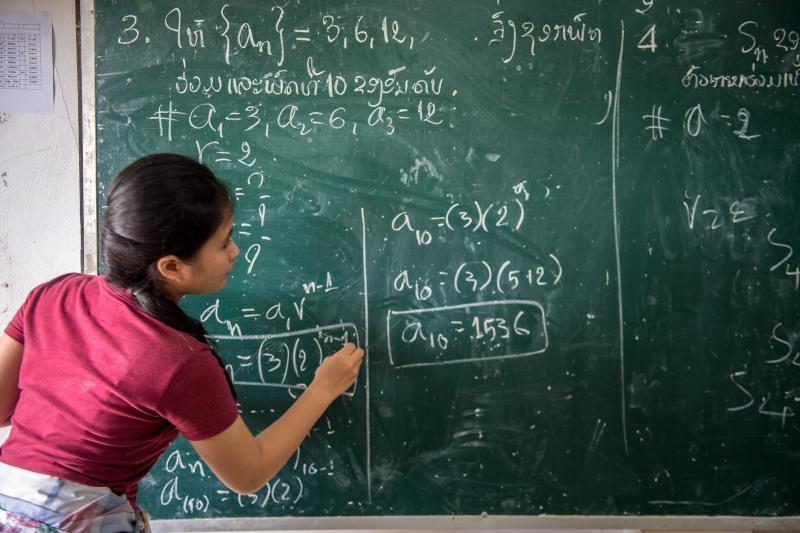
Gender equality and social inclusion (GESI) is both a cross-cutting theme across KIX projects and hubs, and identified as a priority theme in a fifth of the KIX portfolio. KIX recognizes education as both a basic human right and a key driver in reducing poverty and achieving gender equality and quality education for all. To commemorate this year’s International Women’s Day, we collected insights from the leaders of the four KIX regional hubs to find out how they are addressing GESI in their respective regions.
Insights from the KIX Regional Hub for Latin America and the Caribbean (KIX LAC)
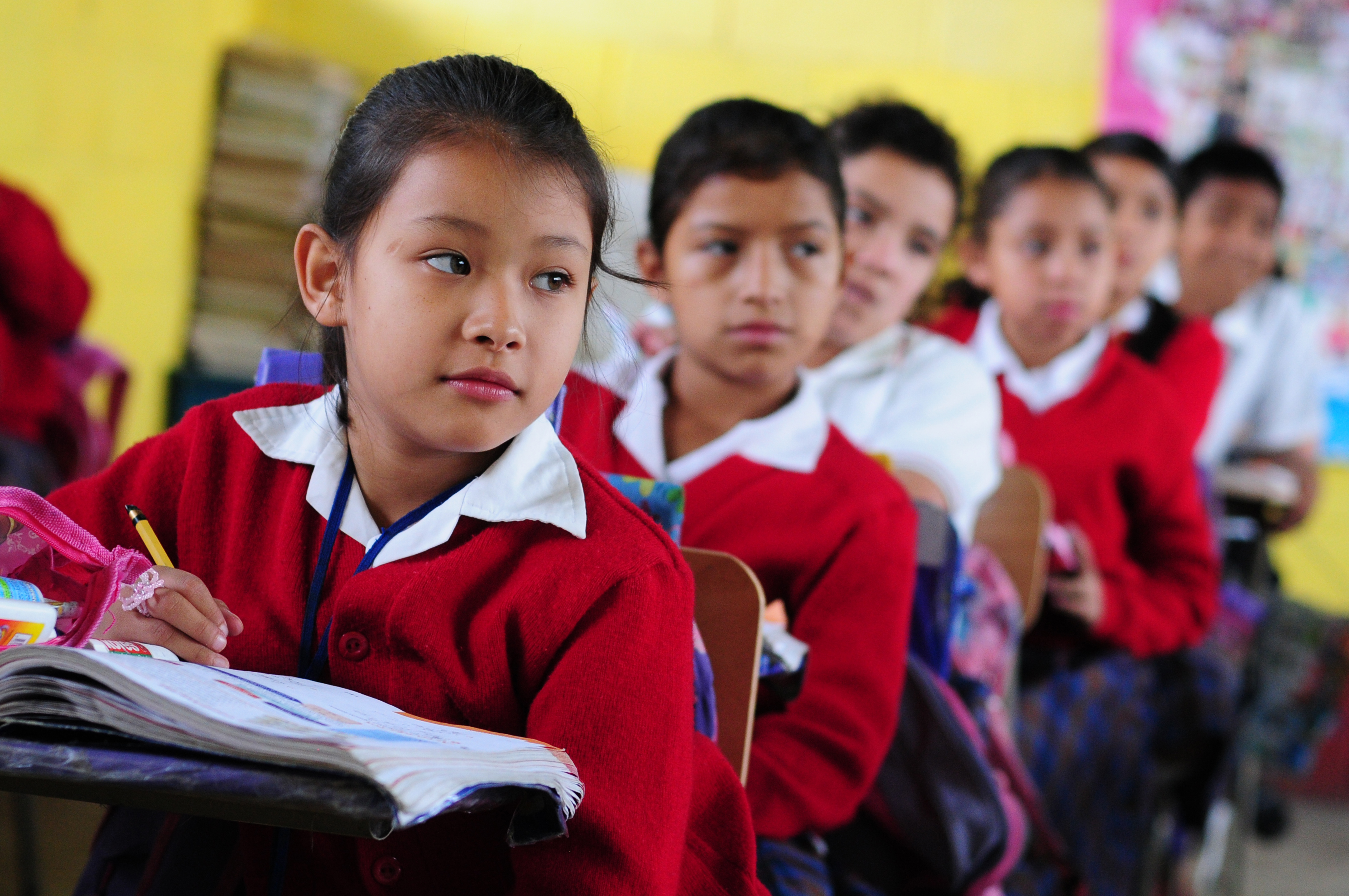 Children listen to their teacher in their classroom in El Renacimiento school, in Villa Nueva, Guatemala. Credit: Maria Fleischmann/World Bank
Children listen to their teacher in their classroom in El Renacimiento school, in Villa Nueva, Guatemala. Credit: Maria Fleischmann/World Bank
Despite the progress made in recent decades, numerous difficulties and barriers persist in Latin America and the Caribbean (LAC) for girls and young women in the goal of achieving gender equality. These include disadvantages in access to formal education; significant differences in learning outcomes in standardised tests in LAC -such as PISA 2018 and PISA-D- with lower results in mathematics for girls; and lower participation of women in STEM (Science, Technology, Engineering and Mathematics) fields. At the structural level, 43% of the ministries of education have formulated gender-related policies, thus reiterating the need for many countries to make progress in this regard. At the same time, it is important to recognize that educational disadvantages are aggravated when considering, in addition to gender inequality, others associated with socioeconomic origin, ethnicity, and sexual orientation, to name a few (GEM Report for LAC 2020 "Inclusion and Education: All means All", UNESCO - SUMMA, 2020).
At the regional level, the hub is working to achieve inclusive and gender-equal education in LAC, leaving behind sexist education that reproduces stereotypes, as well as an intersectionality perspective to address the multiplicity of socio-educational disadvantages. The hub highlights the active participation of women leaders from the 10 countries that make up the hub - in the formulation and implementation of public policies, from civil society or from universities and study centres - promoting valuable visions in the different spaces for dialogue on educational policy.
Today is an appropriate moment to highlight the work of the Ministry of Education of El Salvador, which is promoting an agenda to strengthen the gender equality approach in policies and programs: in the curriculum, educational resources, teacher training and school management at different levels of education. As Yeny Rivas, Gender Manager of the Ministry points out, "the educational system reproduces or reinforces gender stereotypes [...] if we do not educate for equality, if the teaching staff does not acquire new learning to be able to reach the classroom, we will never have an education with quality and equity". This March 8, we invite you to attend a new session of KIX Conversations with the representative of El Salvador for KIX.
Insights from the KIX Regional Hub for West and Central Africa and the Indian Ocean (KIX Africa 21)
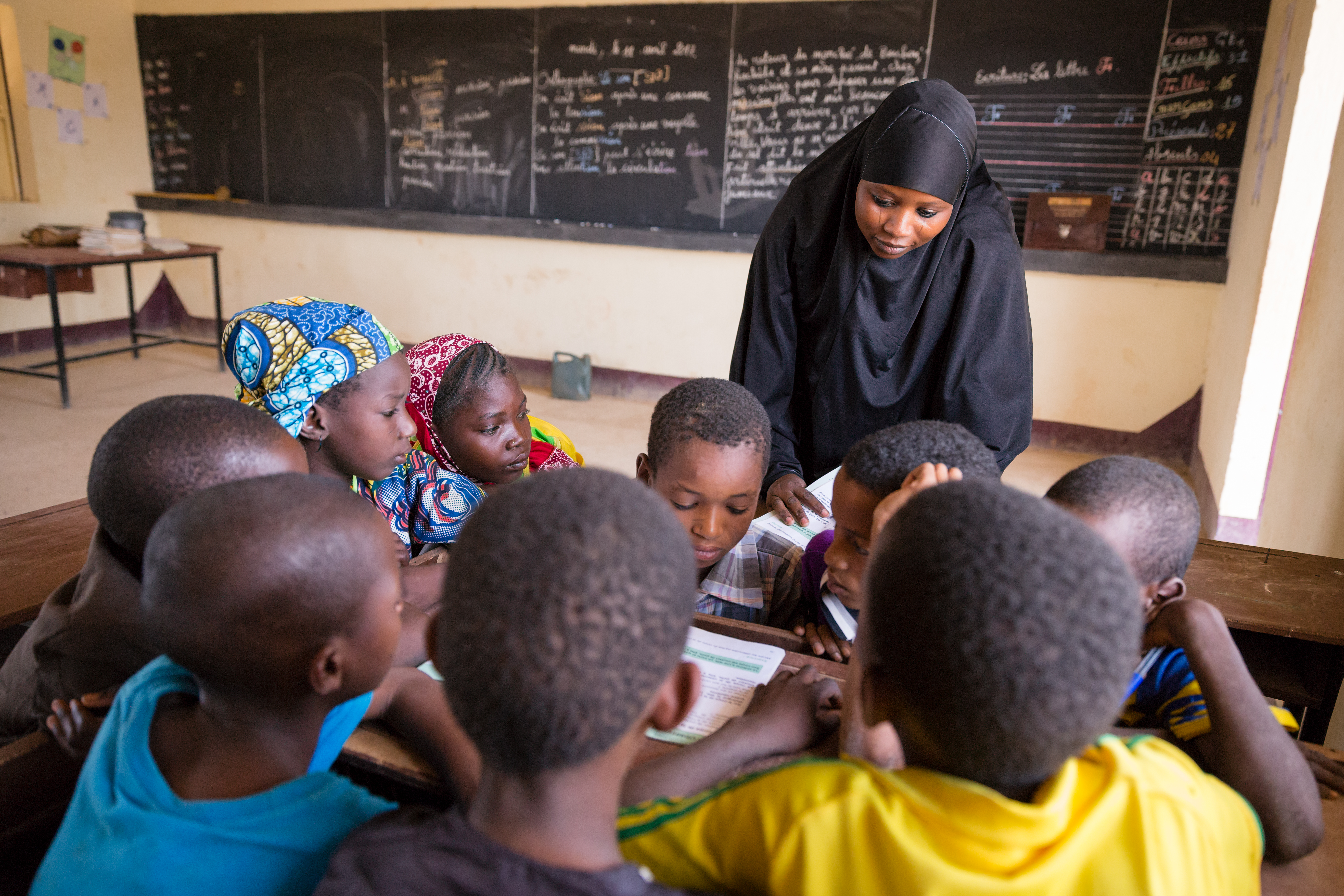 Grade three students share a textbook with the teacher looking on at Ecole Patti, in Makalondi, Tilaberri Region,Niger. Credit: GPE/Kelley Lynch
Grade three students share a textbook with the teacher looking on at Ecole Patti, in Makalondi, Tilaberri Region,Niger. Credit: GPE/Kelley Lynch
Considered as one of the fundamental pillars of sustainable development, equitable access to quality education for all school-age girls and boys, as well as their retention in the education system, remains a real challenge in spite of the numerous efforts made by countries and development partners. In sub-Saharan Africa, 33% of girls and 29% of boys do not complete elementary school. It is with good reason that the issue of gender equality and social inclusion was identified as a major challenge in the study conducted by the KIX Africa 21 hub for the identification of regional priorities in education.
During two roundtable discussions (roundtable 1 | roundtable 2) organised by the KIX Africa 21 hub, partner countries highlighted some actions implemented for the achievement of gender equality in education. Discussions at these events noted the following progress in the following areas:
- planning and budgeting for gender-sensitive projects;
- the establishment of provisions (political and/or judicial) to promote compulsory access to education for all;
- the eradication of sexist stereotypes from school textbooks;
- the consideration of the gender issues in the training, attitudes and pedagogical approaches of teachers;
- the creation of a school environment adapted for girls with the availability of separate toilets;
- the presence of women as teachers and role models for young girls; and
- the creation of frameworks for dialogue between schools and parents on socioeconomic and cultural practices that discourage girls' retention in school.
These solutions, although relevant, are not always known, let alone adopted by all partner countries. It is therefore essential for the KIX Africa 21 hub to continue to share this knowledge and these good practices in order to allow countries to capitalise on them in educational programs. In addition, the results of calls for knowledge and innovations launched by countries such as Burkina Faso and Senegal can help support this strategy of mobilising and sharing evidence-based resources. The hub's 2022 programming also includes capacity building and experience sharing activities in collaboration with specialised organisations such as the Forum for African Women Educationalists (FAWE) and the African Union-Centre for Girls and Women's Education in Africa (AU-CIEFFA). The objective of these activities is to facilitate the implementation of gender-responsive sectoral plans supported by a policy of monitoring and evaluation of progress.
Insights from the KIX Regional Hub for East, West and Central Africa (KIX Africa 19)
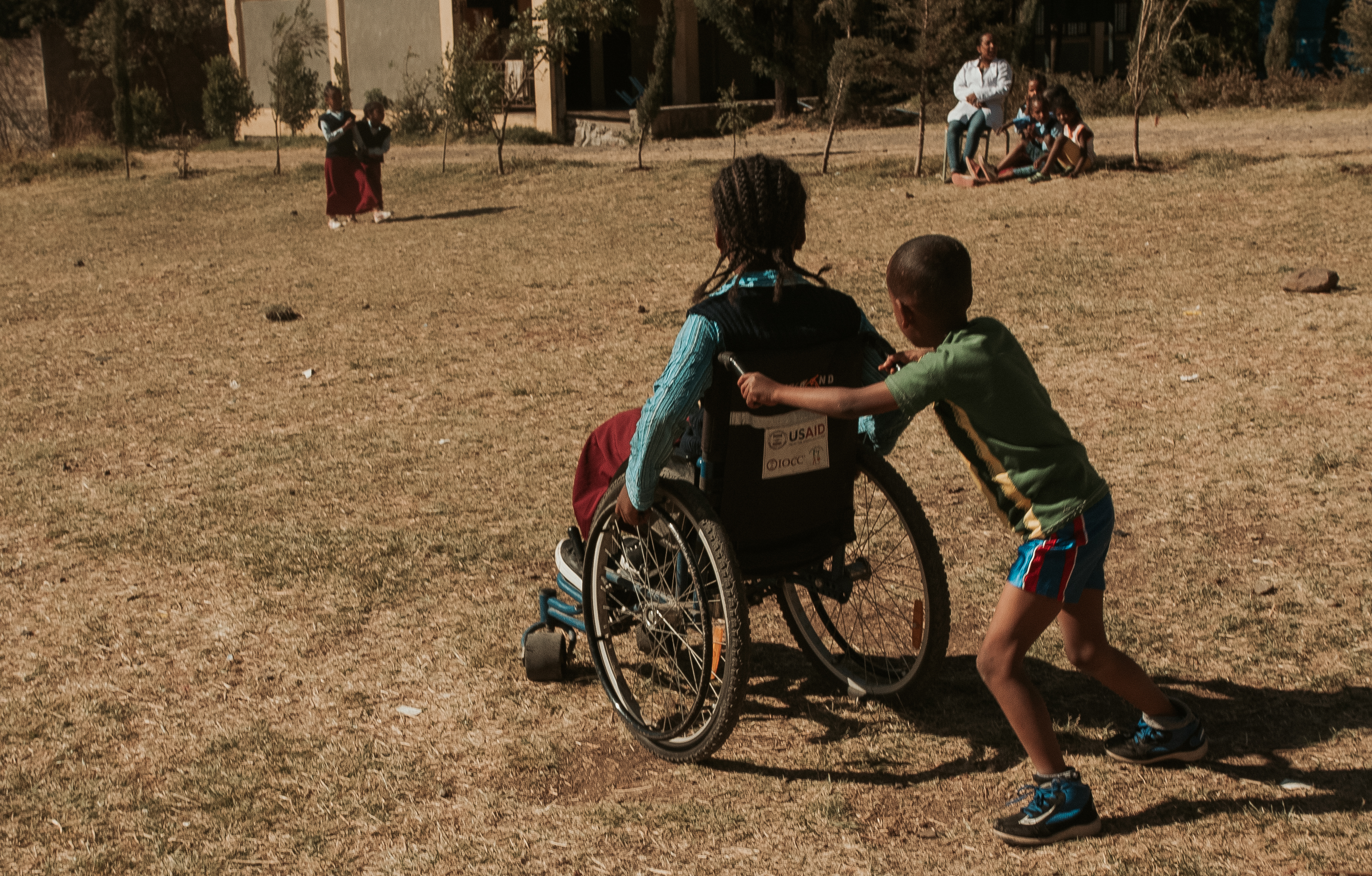 One student pushes his classmate in a wheelchair in the school yard at the Menelik II Primary School in Addis Ababa. Credit: GPE/Alexandra Humme
One student pushes his classmate in a wheelchair in the school yard at the Menelik II Primary School in Addis Ababa. Credit: GPE/Alexandra Humme
Gender inequality has a profound impact on the lives of children. There is a direct correlation between a child’s gender and the possibility of realising their rights and enjoying their full potential, with social norms prioritising boys over girls in most aspects of life. Gender equality is fundamental to the achievement of human rights,including access to quality education and therefore, a core thematic area for the 18 countries that make up the KIX Africa 19 Hub.
The KIX Africa 19 hub aims to support countries to accelerate progress toward equitable, inclusive, and quality education through activities such as active learning, showcasing country examples and facilitating plenary discussions, and engaging countries in communities of practice and learning series on gender equality. The events hosted by the hub have showcased key areas that can lead to progress in gender equality in the region, such as:
- Ensuring girls complete secondary school;
- preventing child marriage;
- providing education and care to adolescent mothers; and
- programming to actively include adolescent girls and boys in policy development.
The KIX Africa 19 hub continues to engage relevant policymakers, researchers, and practitioners to deliberate on the value, challenge, and methods of improving interventions related to inclusive education and accelerate progress toward equitable, inclusive, and quality education under Sustainable Development Goal 4 and the African Union’s Continental Education Strategy for Africa (CESA).
Insights from the KIX Regional Hub for Europe Asia and the Pacific (KIX EAP)
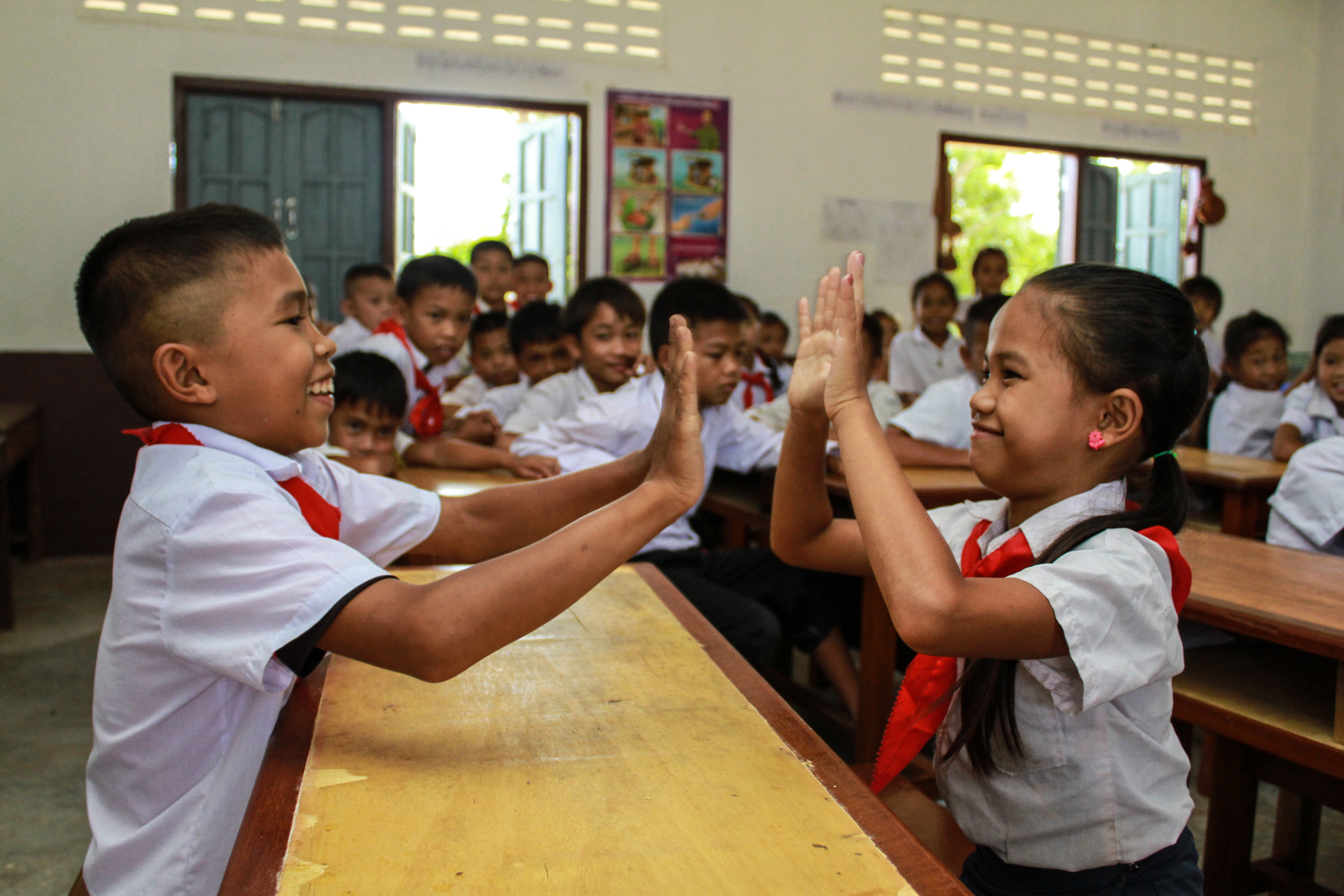 Children attending school at the Chomkeo elementary school in Kenthao District, Sayaboury Province. Credit: Asian Development Bank
Children attending school at the Chomkeo elementary school in Kenthao District, Sayaboury Province. Credit: Asian Development Bank
The KIX Europe, Asia, Pacific (EAP) hub addresses gender equity as both a stand-alone priority and a cross-cutting theme. Before anything else, the hub ensures that women are, at the least, equally represented in the activities, knowledge products and national teams. While we acknowledge that gender-balanced participation cannot be the only avenue to promote gender equity, the KIX EAP hub is committed to promoting spaces in which female education experts can actively engage and contribute to knowledge exchange about education policy and innovation in the region.
Across the activities organised by the hub so far, 57% of participants from KIX EAP countries were women. Moreover, the KIX EAP national teams are composed, on average, of 55% of women and Georgia, Kyrgyz Republic, Moldova and Uzbekistan have female national KIX coordinators.
The hub’s knowledge products also contribute to raising the voices of female education experts and practitioners in the region. For example, in the fourth KIX EAP Podcast, Dr Aminath Shafiya Adam, from the Maldives, explored how she trains future teachers to become “champions” in their classrooms.
Virtual meetings and knowledge exchange activities hosted by the hub also include a focus on gender equality and inclusion. Presenters at the hub’s Education Policy and Innovation Conference (EPIC) explored how histories, politics and hierarchies of power shape children’s lives and can lead to gender discrimination or denial of individual rights through a keynote address while others discussed research on gender equity, gender stereotypes, and comprehensive sexuality education. During the KIX EAP Learning Cycle “Equitable Access to Education with Geospatial Data”, participants learned about how micro-level education planning can address challenges to equitable access to education, as well as how to examine and compare different policy options for advancing gender equality. Building from this experience, a team from Cambodia used geospatial data for identifying which districts have lower completion rates in terms of age groups and gender.
The hub has some upcoming GESI activities currently in the works including a capacity strengthening activity on scaling innovations in GESI and the dissemination of research findings on GESI from KIX global and regional research partners.
